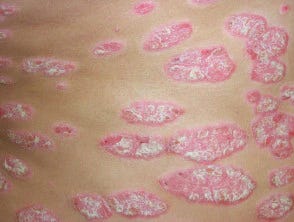Your Daily Meds - 15 December, 2022
Good afternoon and welcome to your late Thursday dose of Your Daily Meds.
Bonus Review: What is autoregulation?
Answer: It is just the tissue’s ability to regulate its own blood supply to the level required for tissue function. It is a process specific to each tissue/organ and is separate from nervous or humoral factors affecting arteriolar resistance.
Scaly Skin:
Consider this -
Which of the following is least likely to be associated with this skin?
Pernicious anaemia
Inflammatory bowel disease
Uveitis
Coeliac disease
Metabolic syndrome
Have a think and meet me further down.
Practice Case:
You are working in Emergency when you meet a young male brought in after a seizure event. You note that he has a diagnosis of epilepsy and was last in ED with a seizure two years ago.
What would you include in a focussed seizure history?
What would you like to know?
Salmon…:
This looks like psoriasis - salmon-red scaly plaques.
Psoriasis is a multifactorial disorder, classified as an immune-mediated inflammatory disease.
Conditions associated with a concurrent diagnosis of psoriasis include:
Psoriatic arthritis and spondyloarthropathy
Inflammatory bowel disease
Uveitis
Coeliac disease
Metabolic syndrome
So of the options listed, pernicious anaemia is least likely to be associated with psoriasis.
(Pernicious anaemia - a cause of vitamin B12 deficiency and anaemia due to autoantibodies targeting intrinsic factor and inhibiting B12 absorption.)
Back to Seizure Man:
In a focussed seizure history in a patient with known epilepsy, you might like to know:
Some history of the event:
Extent of recollection
Presence of preceding symptoms
Extent of memory of event
Post-ictal phase
Pathognomic features of seizure including tongue biting, urinary incontinence
Information from witnesses
Especially the duration of the event
History of aura – to try and distinguish between generalised and focal seizure
Auras represent simple partial seizure/focal aware seizure – reliable history of aura signifies partial, not generalised seizures
Any history of clear aura symptoms such as
Rising feeling in stomach
Déjà vu
Unusual smells or tastes
Sudden intense feelings eg fear or joy
Stiffness or twitching of a body part
Numbness or tingling
Vision change – such as coloured or flashing lights
Diagnosed epilepsy history
Date of diagnosis
Current care
Neurology input
Current medications
Prior investigations
Known causes or triggers of seizure
Not taking medications regularly or at all
Rarely, medication toxicity
Sleep change or disturbance
Alcohol abuse – excess or withdrawal
Other substance abuse
Intercurrent infection – such as meningitis
Head injury
Hypoglycaemia
Among others that you may have thought of…
Bonus: Are there tissues where pressure autoregulation does not occur?
Answer in tomorrow’s dose.
News: I made a little Ward Call Course for you all. It maps out an Evening Ward Call shift and covers a bunch of common tasks that you may need to do, like:
Deteriorating Patients
Heparin Infusions
Fluid Orders
Electrolyte Replacement
Difficult patients - Discharge Against Medical Advice, Ryan’s Rule
End of Life etc
You can find the course page here:
It’s free and always will be. Let me know what you think.
Remember, you are free to rip these questions and answers and use them for your own flashcards, study and question banks.
As always, please contact me with any questions, concerns, tips or suggestions. Have a great day!
Luke.



